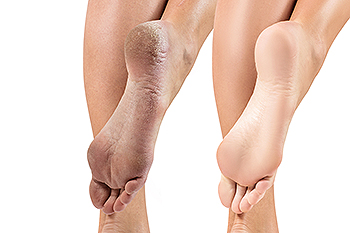NJ (908) 688-5577
NY (212) 737-2528

Having a vitamin deficiency may be a cause for cracked heels to develop. It can be an unsightly and uncomfortable foot condition. Mildly cracked heels affect the top layer of the skin, and it is generally a painless ailment. Fissures are defined as severely cracked heels that may bleed and become infected. Studies show that a lack of vitamin E may affect the collagen in the skin. This is linked to the drying effect that aging has on the skin and may increase the risk of developing cracked heels. It can be beneficial to add foods, such as sunflower seeds, salmon, and avocado to your diet, which are laden with vitamin E. Patients who do not get adequate amounts of vitamin B-3 in their diet may notice their skin becomes dry and scaly, which may be followed by getting cracked heels. If you have questions about how cracked heels are connected to vitamin deficiencies, it is suggested that you speak with a podiatrist.
Cracked heels are unsightly and can cause further damage to your shoes and feet. If you have any concerns, contact Glenn Davison, DPM from Advanced Podiatry. Our doctor can provide the care you need to keep you pain-free and on your feet.
Cracked Heels
Cracked heels appear unappealing and can make it harder for you walk around in sandals. Aside from looking unpleasant, cracked heels can also tear stockings, socks, and wear out your shoes. There are several methods to help restore a cracked heel and prevent further damage.
How Do You Get Them?
Dry skin is the number one culprit in creating cracked heels. Many athletes, walkers, joggers, and even swimmers suffer from cracked heels. Age and skin oil production play a role to getting cracked heels as well.
Promote Healing
Over the counter medicines can help, especially for those that need instant relief or who suffer from chronic dry feet.
Wear Socks – Wearing socks with medicated creams helps lock in moisture.
Moisturizers – Applying both day and night will help alleviate dryness which causes cracking.
Pumice Stones – These exfoliate and remove dead skin, which allows for smoother moisturizer application and better absorption into the skin.
Change in Diet
Eating healthy with a well-balanced diet will give the skin a fresh and radiant look. Your body responds to the kinds of food you ingest. Omega-3 fatty acids and zinc supplements can also revitalize skin tissue.
Most importantly, seek professional help if unsure how to proceed in treating cracked heels. A podiatrist will help you with any questions or information needed.
If you have any questions, please feel free to contact our offices located in Union, NJ and New York . We offer the newest diagnostic and treatment technologies for all your foot care needs.